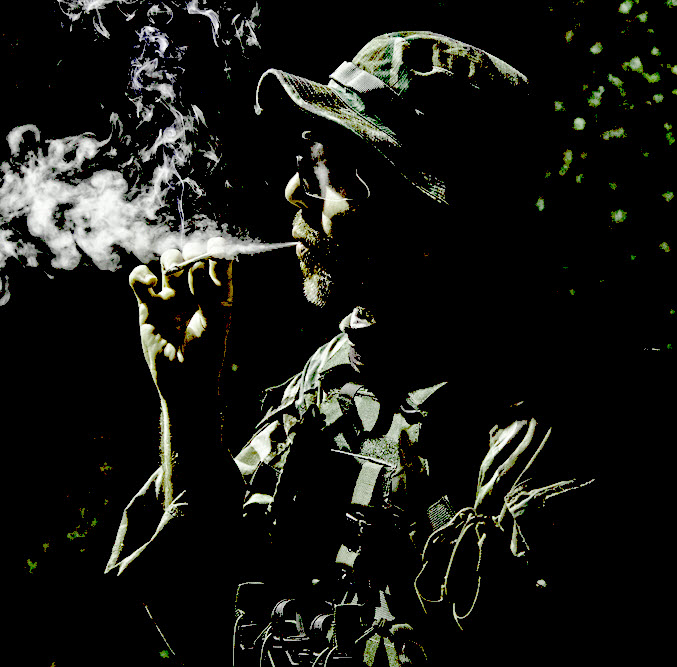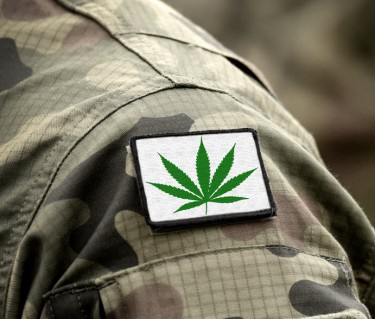
Veterans are betting their lives on medicinal cannabis, so why doesn’t the military agree?
Why vets rely on pot!
Meet Jack, a military veteran who valiantly served his country only to return home with wounds deeper than the eye could see. As he attempted to readjust to civilian life, the burden of PTSD weighed heavily on his soul, a stark reminder of the unspeakable horrors he had endured while on assignment. His nights were tormented by nightmares and his days marred by fear and despair.
Jack sought professional help in search of relief, but the prescribed antidepressants only seemed to deepen his suffering. Desperate for solace, he turned to alcohol, his faithful but treacherous companion in battling his demons. He was a man on the brink, teetering between hope and despair, until one fateful day a veteran offered him a small edible and a hit of a joint.
Skeptical but with no options, Jack took the plunge and as the cannabis began coursing through his veins, something wonderful happened. His tense muscles began to relax, his racing thoughts slowed, and for the first time in what felt like forever, his nervous system went into parasympathetic mode, allowing his mind and body to relax.
Jack’s story echoes the experiences of countless other men and women who have donned the uniform and faced the unimaginable in the service of their country. When they return home, these brave souls often have to contend with the debilitating effects of PTSD and the challenges of re-entering society. Traditional treatments often don’t provide the relief they desperately need, leaving them looking for alternative solutions.
In their quest for healing, many veterans, like Jack, have discovered the transformative power of cannabis. No longer just an illegal substance, marijuana has emerged as a beacon of hope for those struggling with the invisible scars of war. In this article, we’ll dive into the reasons why more and more veterinarians are turning to pot as a viable way to reclaim their lives and find solace amidst the chaos of their inner struggles.
According to the United States Department of Defense (DOD), the primary psychoactive component of marijuana, delta-9 THC, tops the list of substances found in positive drug tests for active military personnel. Runner-up is delta-8-THC, which is becoming increasingly common in hemp-derived products, even in states where marijuana remains illegal.
In response to a 2022 investigation by Sen. Ed Markey (D-MA) and colleagues, the DOD detailed its efforts to combat drug overdoses, promote harm reduction programs, and destigmatize treatment, with a particular focus on combating opioid abuse. The response also revealed that similar to the general population use rate, cannabis is the most common substance detected in drug testing for military personnel.
In FY2021, delta-9-THC accounted for 73.4% of all clear drug-positive tests among active duty members. Although delta-8-THC occurs naturally in trace amounts in cannabis plants, it was found in 42.7% of drug tests, largely due to its synthetic production. The DOD found that delta-9 THC contamination during the delta-8 THC production process explains the co-occurrence of both cannabinoids in many positive tests.
The prevalence of marijuana in positive drug tests for military personnel is due in part to its increasing availability in regulated markets as states legalize it. Another factor is that the inactive metabolite of THC can linger in a person’s body for weeks or months, unlike drugs like cocaine, which are eliminated in a matter of days.
In a letter to Senator Ed Markey, the Department of Defense outlined its efforts to educate military personnel about the risks of substance abuse and the penalties for positive drug tests. The department also implements harm reduction policies to support those seeking treatment and to reduce the stigma attached to addiction.
Sen. Markey stressed the urgency of ensuring access to quality care without stigma or shame. The DOD has been closely monitoring cannabis policy amid the state-level legalization movement. Last year, the department raised concerns about CBD-infused products like hand sanitizer or hemp cereal, suggesting they could hamper military readiness and should therefore be avoided.
But what does “readiness” have to do with CBD or THC anyway? Well, that’s because of government policy related to the War on Drugs.
“Military readiness refers to the readiness of armed forces to respond effectively to any situation or threat and to ensure the security of a nation. It encompasses various aspects of military operations, including personnel, equipment, training and overall force capability.”
Which means that according to military policy, a person’s “readiness” will be affected by the use of cannabis – of any kind!
But what evidence do you have? Or is it just because the federal government doesn’t allow cannabis and as a result – this life-changing medicine is being withheld from the very people who need it most.
Not to mention, wouldn’t a “shock shock” be an indicator of “not being ready”? When the nervous system is so battered that the sound of a car exhaust exploding causes them to fall to the ground.
It’s just another reason we need to end the war on drugs and drug prohibition completely.
Of course, we don’t want military personnel to stumble upon LSD during combat, but these vets should have the right to use it to deal with the side effects of war that the government is so forced to embrace.
In the smoky haze of psychedelics and cannabis, many souls have strayed from the path of violence and embraced a newfound understanding of the human experience. The profound insights gained from these altered states of consciousness often illuminate the futility of endless wars fueled by the machinations of private corporations that sell weapons and destruction for profit.
This revelation may in part explain the military’s reluctance to allow soldiers to use such substances. Imagine a soldier who, after participating in these mind-expanding journeys, begins to empathize with the so-called enemy. They begin to understand that those on the other side of the battle line are also people defending their homeland from what they perceive as a threat.
The ability to see the world through someone else’s eyes and to transcend the narrow confines of cultural and political differences could potentially weaken the resolve of a soldier trained to obey orders without question. This newfound empathy can challenge the very foundations of the military-industrial complex, where unquestioning loyalty and obedience are paramount.
In a world where soldiers can see the humanity in their opponents, the machines of war could grind to a halt, leaving no room for profiteers to exploit the suffering of others. As such, banning cannabis and psychedelics within the military may be less about maintaining military readiness and more about preserving the status quo—a world where divisions are being exploited to advantage and the war machine keeps rolling.
As our society grapples with the consequences of our choices, perhaps it is time to reconsider the wisdom of shutting down access to substances that could promote empathy, understanding, and ultimately a more peaceful world.
As the prevalence of cannabis comes to light in military drug screenings, it is vital for society to recognize the potential mental health value of this plant, especially for those who have faced unimaginable hardships. The mere fact that soldiers bearing the scars of war and its traumatic aftermath are turning to cannabis for relief speaks volumes about its potential therapeutic benefits.
As the military continues to enforce its strict drug use policies, it is time for society as a whole to rethink the way we perceive and use cannabis. The plant could provide some much-needed relief for our veterans, providing a balm for the emotional and psychological wounds that often remain long after the physical ones have healed.
Rather than demonizing cannabis and other mind-expanding substances, we should strive to understand their potential to promote empathy, healing, and unity in a world all too often divided by conflict. By harnessing the therapeutic potential of these substances, we could not only support our soldiers’ mental health, but also contribute to a more compassionate and peaceful society.
In summary, the increasing presence of cannabis in military drug screening is not a cause for alarm, but rather an opportunity for reflection and growth. It is a call for us to open our minds to the potential benefits of this ancient plant and to explore new avenues to promote healing and understanding among the afflicted and injured. Only then can we begin to pave a path toward a brighter, more compassionate future for all.
MEDICAL MARIJUANA FOR Veterans, READ MORE…

WHY VETERANS USE MEDICAL CANNABIS FOR PTSD!

Post a comment: